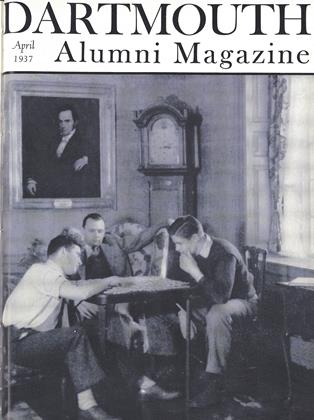TO THE SENIOR, with graduation drawing near, the college year takes on a new perspective. A fierce determination to make the most of the last few weeks is inextricably mingled with the nervousness that comes before comprehensives and with the anticipation or regret of having soon to put a college education to a practical advantage. For many there is confusion in the attempt to live as full a Dartmouth life as possible each day. And all but a few frankly envy the underclassmen.
The year has seen changes on the campus in almost every field. Outstanding among the curricular revisions are the Social Science and Topical Major developments which go into effect next year. The key-note of the program seems to be an attempt to break down the rigid departmentalization that has resulted in repetition of studies, and disadvantages to the undergraduate seeking a general and lessspecialized education. The effect of the new courses on the campus is, of course, unknown, but they seem to bring Dartmouth closer to a still somewhat blurred realization of a liberal college.
The four Topical Majors selected are based on a premise that any study of social phenomena should involve some acquaintance with their historical, economic, governmental and sociological aspect. Major subjects will consist of International Relations, Democratic Institutions, National Problems, Social and Economic, and local Institutions and Problems.
WILLIAM B. ROTCH '37 Editor of the monthly section, "The Undergraduate Chair." His father is Arthur B.Rotch 'OB of Milford, N. H.
 View Full Issue
View Full Issue
More From This Issue
-
 Sports
SportsDeaths
April 1937 -
 Article
ArticleFootball From the Inside Out
April 1937 By DAVID M. CAMERER '37 -
 Sports
SportsFollowing the Big Green Teams
April 1937 By ROBERT P. FULLER '37 -
 Class Notes
Class NotesClass of 1902
April 1937 By Hermon W. Farwell -
 Class Notes
Class NotesClass of 1927
April 1937 By Doane Arnold -
 Article
ArticleGradus Ad Parnassum
April 1937
William B. Rotch ’37
-
 Article
ArticleWith the Outing Club
October 1936 By William B. Rotch ’37 -
 Article
ArticleDEBATERS PLAN ACTIVE YEAR
February 1937 By William B. Rotch ’37 -
 Class Notes
Class Notes1937
FEBRUARY 1963 By William B. Rotch ’37, FRANKLIN E. ROBIN -
 Class Notes
Class Notes1937
OCTOBER 1965 By William B. Rotch ’37, FRANKLIN E. ROBIN, FRANCIS T. FENN JR. -
 Class Notes
Class Notes1937
JANUARY 1966 By William B. Rotch ’37, FRANKLIN E. ROBIN, FRANCIS T. FENN JR. -
 Class Notes
Class Notes1937
JUNE 1966 By William B. Rotch ’37, JEROME H. LOW







